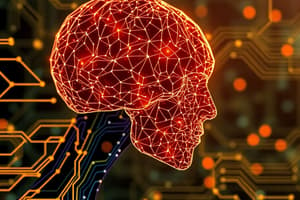Podcast
Questions and Answers
What is a key feature of edge computing?
What is a key feature of edge computing?
- Tasks are executed on devices directly. (correct)
- AI processes data in a centralized cloud.
- It relies solely on quantum computing.
- It reduces the use of local processing power.
What is the main goal of Explainable AI (XAI)?
What is the main goal of Explainable AI (XAI)?
- To develop understandable AI decision-making processes. (correct)
- To eliminate the need for ethical guidelines.
- To enhance AI capabilities without human input.
- To make AI systems more complex and opaque.
What significant benefit does human-AI collaboration provide?
What significant benefit does human-AI collaboration provide?
- AI enhances human capabilities instead of replacing them. (correct)
- AI diminishes human skills and capabilities.
- It is solely focused on lowering operational costs.
- AI completely takes over human jobs.
Which of the following issues can AI potentially help to address?
Which of the following issues can AI potentially help to address?
What is necessary for responsible AI development?
What is necessary for responsible AI development?
What is the primary characteristic of Narrow or Weak AI?
What is the primary characteristic of Narrow or Weak AI?
Which of the following is NOT a key component of AI systems?
Which of the following is NOT a key component of AI systems?
What is the goal of Deep Learning in AI?
What is the goal of Deep Learning in AI?
Which application of AI is primarily aimed at enhancing patient care and treatment?
Which application of AI is primarily aimed at enhancing patient care and treatment?
How can AI systems perpetuate societal biases?
How can AI systems perpetuate societal biases?
What ethical concern is raised by the use of AI in warfare?
What ethical concern is raised by the use of AI in warfare?
Which of the following is an example of AI in customer service?
Which of the following is an example of AI in customer service?
What challenge does AI face regarding transparency and explainability?
What challenge does AI face regarding transparency and explainability?
Flashcards
Artificial Intelligence (AI)
Artificial Intelligence (AI)
Computer systems performing tasks needing human intelligence, such as learning and decision-making.
Narrow/Weak AI
Narrow/Weak AI
AI designed for specific tasks (like spam filters or product recommendations).
Machine Learning (ML)
Machine Learning (ML)
AI subset where systems learn from data without direct instructions.
Deep Learning (DL)
Deep Learning (DL)
Signup and view all the flashcards
Natural Language Processing (NLP)
Natural Language Processing (NLP)
Signup and view all the flashcards
Computer Vision
Computer Vision
Signup and view all the flashcards
Bias in AI
Bias in AI
Signup and view all the flashcards
General/Strong AI
General/Strong AI
Signup and view all the flashcards
Edge computing in AI
Edge computing in AI
Signup and view all the flashcards
Explainable AI (XAI)
Explainable AI (XAI)
Signup and view all the flashcards
Quantum computing's role in AI
Quantum computing's role in AI
Signup and view all the flashcards
AI and climate change
AI and climate change
Signup and view all the flashcards
Responsible AI development
Responsible AI development
Signup and view all the flashcards
Study Notes
Defining Artificial Intelligence
- Artificial intelligence (AI) encompasses computer systems able to perform tasks normally requiring human intelligence.
- These tasks include learning, problem-solving, decision-making, and pattern recognition.
- AI systems are designed to mimic human cognitive abilities, though not necessarily with the same underlying mechanisms.
Types of Artificial Intelligence
- Narrow or Weak AI: Designed for specific tasks, like spam filtering or recommending products. This is the most prevalent type of AI currently.
- General or Strong AI: Hypothetical AI possessing human-level intelligence and capable of learning any intellectual task a human can. This level of AI is not yet realized.
Key Components of AI Systems
- Machine Learning (ML): A subset of AI enabling systems to learn from data without explicit programming.
- Deep Learning (DL): A subset of ML using artificial neural networks with multiple layers to extract complex patterns from large datasets.
- Natural Language Processing (NLP): Enables computers to understand, interpret, and generate human language.
- Computer Vision: Enables computers to "see" and interpret images and videos.
- Expert Systems: AI systems based on knowledge bases and inference rules, often used for specific problem-solving tasks.
Applications of AI
- Healthcare: AI diagnosis, drug discovery, personalized medicine.
- Finance: Fraud detection, risk assessment, algorithmic trading.
- Transportation: Autonomous vehicles, traffic optimization, logistics.
- Customer Service: Chatbots, automated support systems.
- Manufacturing: Automated production, quality control, predictive maintenance.
- Entertainment: Personalized recommendations, content generation.
Ethical Considerations of AI
- Bias in AI: AI systems trained on biased data can perpetuate and amplify societal biases.
- Job displacement: Automation through AI raises concerns about employment.
- Privacy and security: AI systems often collect and analyze vast amounts of data, raising privacy issues.
- Autonomous weapons: The use of AI in warfare raises complex ethical questions.
- Transparency and explainability: Understanding how AI systems arrive at their decisions can be challenging, leading to concerns about fairness.
Current Trends and Future Directions
- Edge computing: AI executing tasks directly on devices rather than relying on cloud servers, increasing speed and efficiency.
- Explainable AI (XAI): Research focused on developing AI systems whose decision-making processes are understandable.
- Quantum computing: Development of powerful computing systems that could potentially accelerate AI advances.
- Human-AI collaboration: AI enhancing human capabilities rather than replacing workers entirely.
AI and Society
- AI has the potential to address significant global challenges like climate change, disease, and poverty.
- Responsible AI development needs ethical guidelines, robust regulations, and ongoing public discussion.
- The societal impact of AI warrants careful consideration to ensure its benefits are widely shared.
Studying That Suits You
Use AI to generate personalized quizzes and flashcards to suit your learning preferences.




